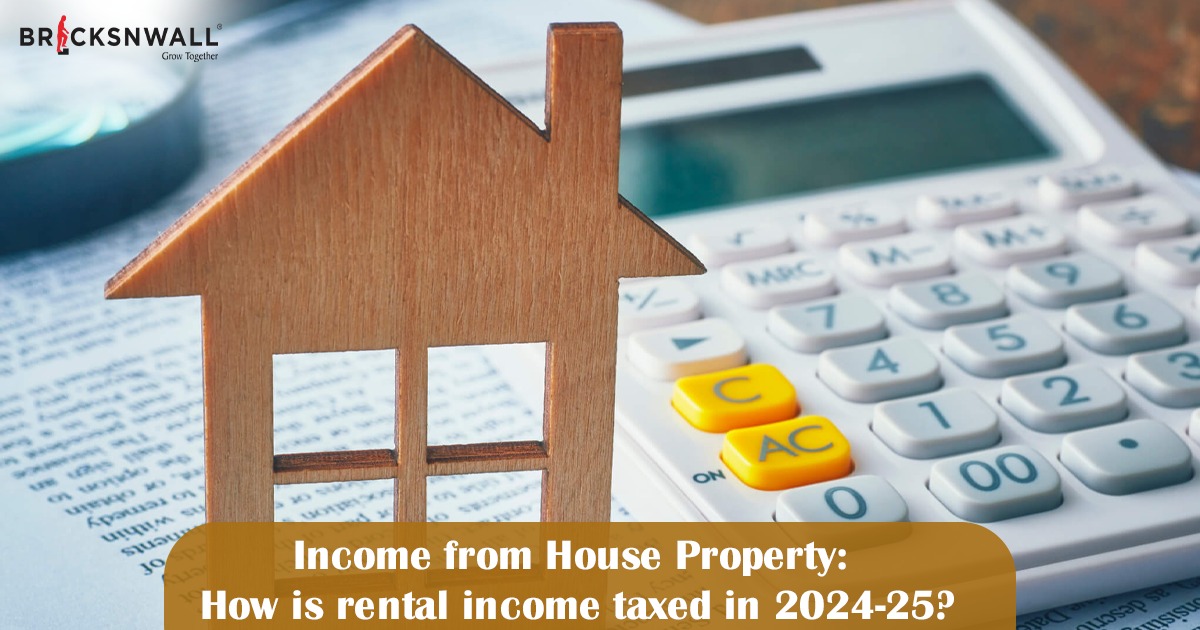Income from House Property: How is rental income taxed in 2024-25?
Bricksnwall Trusted Experts

Monthly rentals are the best option if you're searching for a steady passive income. After all, this is among the quickest ways to profit from real estate investments without having to worry about taking significant risks. However, did you realize that the Income Tax Act taxes rental income? In this blog, let bricksnwall describe how rental income is taxed, how it is calculated, and what exemptions are available.
Which kind of income are there?
The Income Tax Act has separated an individual's income into five categories for the goal of simplifying tax calculations. They are as follows:
- Salary income
- Revenue from real estate
- revenue from a firm or profession's gains and
profits
- Capital gains income
- Other sources of income
In general, "income from house property"
refers to the sum obtained from the rental of residential properties. After
basic deductions, interest paid on a continuing home loan, and municipal taxes
are subtracted, the tax on rental income is calculated.
What is considered income from real estate?
It's crucial to remember that not all residential rentals fall under the category of "income from house property." The several sources that are subject to this section's taxation are as follows:
Which section applies to the taxation of income from residential property?
According to Section 22 of the Income Tax Act,
income from residential property is subject to taxation under the following
circumstances:
a) There ought to be a tangible property with a
building or land that is connected to it.
c) The property should be owned by the assessee.
c) The property owner shouldn't use the property for his personal business or occupation.
Does rental income have to be subject to GST?
While residential property rental revenue is free from the Goods and Services Tax (GST) Act, commercial property rental income is subject to an 18% GST.
How is rental income subject to income tax?
Here's how Indian rental income taxes are
calculated:
Determine the rental property's Gross Annual Value (GAV). This is the amount of rent that the tenant pays each year.
To calculate the Net Annual Value (NAV), deduct the amount of property tax paid from the Gross Annual Value. One municipal tax that is paid to the appropriate municipal body each year is the property tax, sometimes known as the house tax.
The standard deduction allowed by Section 24A of
the Income Tax Act is thirty percent of the Net Annual Value (NAV).
Once the usual deductions have been made, the full interest paid on a housing loan for a rental property taken out by the owner during the fiscal year may be subtracted from rental revenue. Section 24B of the Income Tax Act permits this refund.
The remaining sum is an individual's taxable rental income, which is subject to income taxation in accordance with the relevant tax slab.
Example of calculating rental tax To further explain the computation procedure, let's look at an example. In this instance, the apartment rent is Rs 25,000 per month, the property tax is Rs 20,000, and the house loan interest is Rs 80,000. The rental income calculation is broken down step-by-step in the table below.
|
Parameters |
Calculation |
|
Monthly
Rent |
Rs
25,000 per month |
|
Gross
Annual Value (GAV) |
12
(months) x Rs 25,000 = Rs 3,00,000 annually |
|
Property
Tax |
Rs
20,000 per year |
|
Net
Annual Value (NAV) |
Rs
3,00,000- Rs 20,000 = Rs 2,80,000 annually |
|
Standard
Deduction |
30%
of Rs 2,80,000 = Rs 84,000 |
|
Interest
Paid on Home Loan |
Rs
80,000 |
|
Total
Taxable Income |
Rs
2,80,000- Rs 84,000- Rs 80,000 = Rs 1,16,000 |
Is NRIs' rental income subject to taxes in India?
Section 24 of the Income Tax Act imposes taxes on rental income received by non-resident individuals. On the other hand, the tenant pays taxes on behalf of the owner on properties owned by non-resident Indians.Here's how the process goes- After deducting the TDS (Tax Deducted at Source), the tenant makes the payment to the NRI's account.After that, he or she files Form 15CA with the Income Tax Department and delivers the TDS form to the appropriate authority.
How to save tax on
rental income?
Here's a recap of the available deductions that can help homeowners save tax on rental income: Deductions through Gross Annual Value (GAV)- Apart from factoring in the rent received,
When determining GAV, any rent loss resulting from vacancy or unrealized rent can also be subtracted from the actual amount of rent owed. Standard deduction: According to Section 24A of the Income Tax Act, property owners are eligible to claim a standard deduction of 30% of the property's NAV under the painting and repairing provision. Home loan interest deduction: Under Section 24B, the owner may deduct the entire home loan interest component if the property is rented out and the loan installments are in progress.
- It will be evident from the proposed amendments in the Finance Bill 2024 that rental income from residences should be declared as Income from House Property rather than Business Income. This modification attempts to ensure that people accurately disclose their income and stop tax avoidance.
- Determine the rental property Gross Annual Value (GAV). This is the amount of rent that the tenant pays each year. To calculate the Net Annual Value (NAV), deduct the amount of property tax paid from the Gross Annual Value.
- Rental income is taxable as income from home property and is typically thought of as passive income. If the entire GAV is less than ₹250,000, rental income might not be taxed.
- Only the owner property taxes from the previous year need to be deducted in order to calculate NAV. d. Take 30% of NAV as a standard deduction: This amount is allowed by Section 24 of the Income Tax Act.







